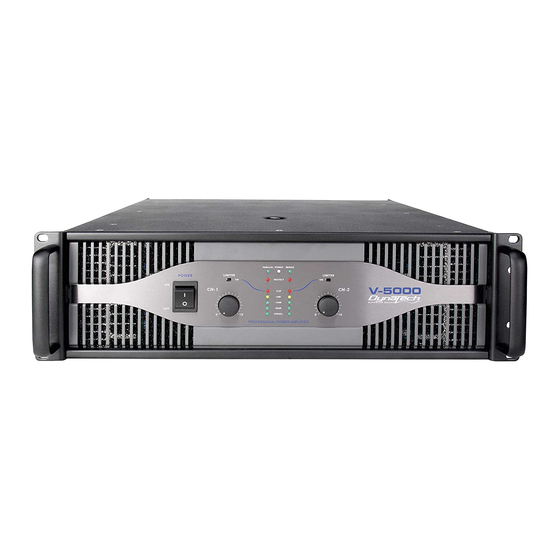Dynatech V-7000 Instrucciones de uso - Página 11
Navegue en línea o descargue pdf Instrucciones de uso para Amplificador Dynatech V-7000. Dynatech V-7000 16 páginas. Professional

- 1. User Instructions
- 2. Table of Contents
- 3. Safety Precautions
- 4. Introduction
- 5. Front Panel
- 6. Rear Panels
- 7. Inputs
- 8. Outputs
- 9. Speakon Output Connector Assembly
- 10. Operating Modes
- 11. Limiter
- 12. Short Circuit Protection
- 13. Thermal Protection
- 14. Amplifier Features
- 15. Subwoofer and Speaker Setup
- 16. Specifications
Mono Subwoofer - This operation is similar to the Stereo Subwoofer operation but in mono. When running subwoofers it is usually
recommended to run them in mono mode to achieve a cleaner tighter low end. This operation allows you to run several subwoofers
down to a minimum of 2 ohms. T o avoid amplifier overheating, never run the amplifier below 2 ohms in this mode. Set up this mode
as you would a standard stereo set up. Be sure both channels are set to "SUBWOOF" and the mode switch is set to "MONO." In this
mode you may use the frequency adjustment on the rear of the amp, to control the bass frequency output level. Frequencies may be
adjusted from 20Hz to 200Hz.
One Channel Normal/One Channel Subwoofer (BI-AMP) - Y ou may also use your amp to bi-amp your system. Y ou may use one
side of the amp to power a subwoofer and the other side to power a full range speaker. Follow the set up guides listed above to mix
and match your operations.
PROTECTION:
Limiter - The V-5000/7000 series comes with a built in limiter. When the input signal overloads, the "CLIP LED's" indicate a signal
overload, at this time, the master volume should be lowered to reduce distortion. If the input gain level is not reduced the built-in lim-
iter will activate. During signal overload, the limiter will reduce the input audio signal enough to minimize the amount of clipping. A
limiter takes the gain of an overloading signal and reduces it, the reduction in gain reduces distortion that can cause damage to your
speakers and amplifier. During normal operation below clipping, and momentary clips on peaks, the limiter does not affect the audio
signal and is inaudible. It will allow brief clipping of peaks and will only activate when continuous, hard clipping occurs. During exces-
sive clipping the limiter will reduce the audio signal enough to minimize the amount of clipping. When the input signal decreases
enough that clipping ends, the limiter will deactivate and cease its gain reduction. The limiter has a fixed threshold and can not be
adjusted.
Safe Power Levels at Different Output Loads:
8-Ohm Loads: The amplifier can operate at practically any power level without risk of overheating. However, if it is pushed hard
enough to continually light the "CLIP " indicator, the amplifier's average output power can reach 150 watts.
4-Ohm Loads: If the "CLIP" indicator flashes occasionally, the amplifier is approaching its maximum long-term power capacity. If it is
lit about half the time, the amplifier channel will probably go into thermal protection within a few minutes.
2-Ohm Loads: Except for an occasional flash, keep the "CLIP" indicator dark to avoid overheating the amplifier channel. Clipping
should be kept to a reasonable minimum. An amplifier's peak current draw at full output power into 2 ohms is several times what the
"normal " draw is, but its various protection circuits will prevent this condition lasting more than a minute or two.
Short Circuit Protection - The V-5000/7000 series amplifiers all come with built-in Output Short
Circuit Protects. The Output Short Circuit Protection protects the output devices of the amplifier
from short circuits and stressful loads. If your speaker lines short, the amplifier automatically detects
this problem and discontinues operation for that channel. If one side of your amplifier becomes
shorted and goes into protect mode, the other side will continue to operate normally. During short
circuit protection, the "Clip" LED and "Protect" LED will light simultaneously indicating amplifier
fault. All channel output during the "Short Circuit Protection" will be interrupted (i.e. no sound out
page 11
